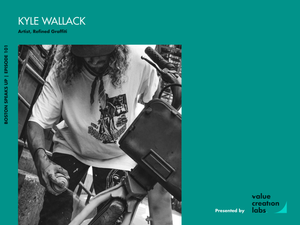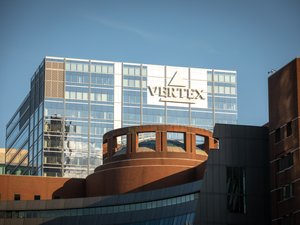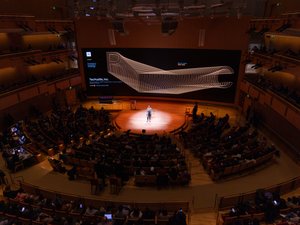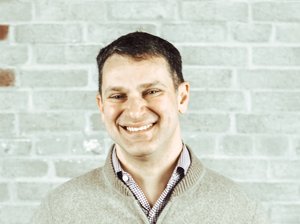When Gov. Charlie Baker walked to the podium at BostInno's State of Innovation, Tuesday, you already knew he was going to talk about GE moving its headquarters to Boston. And it was a good bet he'd talk about digital health, where the state government has supported a new, $26 million investment fund backed by private companies.
"There's going to be a big, big confluence of opportunity," Baker said of digital health, a sector he described as straddling electronic medical records, wearables, wireless technology and big data. "It's where I believe we have a lot of players embedded."
That confluence of opportunity already exists. It's at the intersection of Main and Vassar streets in Kendall Square (pictured), where Draper Labs, the Broad Institute, the Whitehead Institute, the McGovern Institute, MIT's Stata Center and the David H. Koch Institute for Cancer Research are all within a block. Up the street are Google and Microsoft; a block away sits Akamai and the Volpe National Transportation Systems Center; a few steps further, Cambridge Innovation Center has "more startups than anywhere else on the planet."
It's the reason global life sciences and high-tech companies feel the need to pay Kendall Square's exorbitant rents: the talent, the ideas and the cross-pollination between organizations is a catalyst for innovation and survival. Steven Marsh, managing director at MIT's Investment Management Co., understands the global need for that kind of collaboration. It informs MITIMCo's real estate development plans, he told me last year.
But it's hard to cross-pollinate when you can't go across the street to work at a different company. Of the firms I mentioned above, at least one, Akamai, has in the past stood up to defend the status quo on noncompetes. The reasons tend to be predictable:
"Talent and innovative ideas are the fuel that powers technology companies," wrote the Mass. High Tech Council, one of Massachusetts' oldest tech trade organizations, in 2015. That year, MHTC was one of the organizations that helped squash noncompete reform. "It is critical to continue to permit them to use well-established and predictable legal tools to protect those assets and investments, particularly from direct business competitors."
TL;DR: Noncompetes make it easier (read: cheaper) for companies to hang onto talent and ideas. That sounds like the exact opposite of what John Gordon, chief digital officer of GE Current, says happens in Silicon Valley. "In the Bay Area, everything is so transparent," he said at State of Innovation, immediately following Baker's speech. Bay Area operators face their competitors and think, "Our job is to activate the market," he said. "If we activate the market, we both win."
We know how expensive talent is in the Bay Area. Here's another way to look at it: In the Bay Area, compensation isn't a cost, it's an investment. Between panels at State of Innovation, Myron Kassaraba, who advises tech companies on licensing and transactions at MJK Partners, told me his theory about why Silicon Valley has so many more angel investors: More competition for talent means more compensation--which in Silicon Valley often means equity. More equity means more millionaires, willing to write five-figure checks to seed the next wave of startups.
Right now, the state Legislature in Massachusetts could take a needed step toward limiting noncompetition agreements in one of the most innovative states in the US. Or, it could pass a stripped-down reform bill that would have little effect but to limit the length of noncompete agreements to a year. For most people working in technology or any other sector, that might as well be forever.
When the previous governor, Deval Patrick, spoke at State of Innovation in 2014, making noncompetes unenforcable in Massachusetts was one of his legislative priorities. So far, Gov. Baker has remained nearly silent on the issue. When he took the podium Tuesday, he talked about "a new way of doing business" that allows talented people to collaborate across industries.
We'd have a lot more of that if we stopped stifling talented people's right to compete.
Satellite image of Main and Vassar Streets in Kendall Square via Google.
Editor's note: An earlier version of this story mis-stated Myron Kassaraba's role at MJK Partners. He advises tech companies on licensing and transactions.








